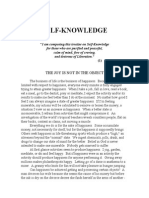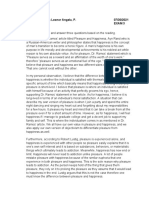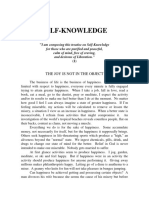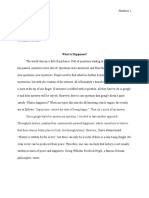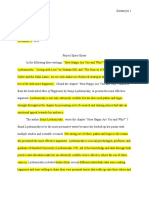0% found this document useful (0 votes)
47 views4 pagesSyllogistic Reflection 5
The document summarizes the author's reflections on happiness and emotional numbness at the end of the semester. The author questions whether feeling numb is okay, and wonders why they are not happy despite meeting their goals of studying hard and doing well. The author analyzes perspectives on happiness from Kant, Socrates, and Lenoir. Kant defines happiness as getting what you want, but the author is unsure what they truly want. Socrates says to identify what is good for your soul rather than pursuing conventional or easy happiness. Lenoir says the journey is more important than the goal, and happiness comes from enjoying progress towards aspirations. The author resolves to search sincerely for what will make their soul happy
Uploaded by
Andrea María Lessage HerreraCopyright
© © All Rights Reserved
We take content rights seriously. If you suspect this is your content, claim it here.
Available Formats
Download as PDF, TXT or read online on Scribd
0% found this document useful (0 votes)
47 views4 pagesSyllogistic Reflection 5
The document summarizes the author's reflections on happiness and emotional numbness at the end of the semester. The author questions whether feeling numb is okay, and wonders why they are not happy despite meeting their goals of studying hard and doing well. The author analyzes perspectives on happiness from Kant, Socrates, and Lenoir. Kant defines happiness as getting what you want, but the author is unsure what they truly want. Socrates says to identify what is good for your soul rather than pursuing conventional or easy happiness. Lenoir says the journey is more important than the goal, and happiness comes from enjoying progress towards aspirations. The author resolves to search sincerely for what will make their soul happy
Uploaded by
Andrea María Lessage HerreraCopyright
© © All Rights Reserved
We take content rights seriously. If you suspect this is your content, claim it here.
Available Formats
Download as PDF, TXT or read online on Scribd
/ 4











